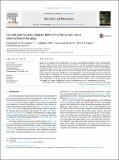Sex and pairing status impact how zebra finches use social information in foraging
Date
06/2017Author
Grant ID
NE/J018694/1
BB/M013944/1
NF120136
BB/I007997/1
ERC-2011-AdG
Metadata
Show full item recordAbstract
Many factors, including the demonstrator’s sex, status, and familiarity, shape the nature and magnitude of social learning. Given the important role of pair bonds in socially-monogamous animals, we predicted that these intimate relationships would promote the use of social information, and tested this hypothesis in zebra finches (Taeniopygia guttata). Observer birds witnessed either their mate or another familiar, opposite-sex bird eat from one, but not a second novel food source, before being allowed to feed from both food sources themselves. Birds used social information to make foraging decisions, but not all individuals used this information in the same way. While most individuals copied the foraging choice of the demonstrator as predicted, paired males did not, instead avoiding the feeder demonstrated by their mate. Our findings reveal that sex and pairing status interact to influence the use of social information and suggest that paired males might use social information to avoid competing with their mate.
Citation
Templeton , C N , Philp , K , Guillette , L M , Laland , K N & Benson-Amram , S 2017 , ' Sex and pairing status impact how zebra finches use social information in foraging ' , Behavioural Processes , vol. 139 , pp. 38-42 . https://doi.org/10.1016/j.beproc.2016.12.010
Publication
Behavioural Processes
Status
Peer reviewed
ISSN
0376-6357Type
Journal article
Description
This research was funded by fellowships from NERC (NE/J018694/1) to CNT and BBSRC (BB/M013944/1) to LMG and grants from Royal Society (RG2012R2), MJ Murdock Charitable Trust (2014199), BBSRC (BB/I007997/1 and BB/M013944/1), and ERC (ERC-2008-AdG).Collections
Items in the St Andrews Research Repository are protected by copyright, with all rights reserved, unless otherwise indicated.

